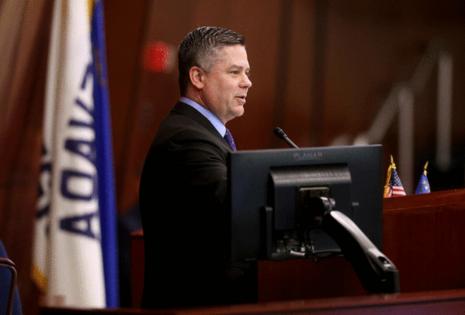What are they hiding? Bill to subject Nevada Legislature to public records fails
Published in News & Features
LAS VEGAS — Though the Nevada Legislature creates public records laws, it is not subjected to follow them. The public can’t examine legislators’ emails, or view investigative documents on legislators’ alleged misconduct.
An inside effort in the Legislature to change that failed this session.
Assembly member Heidi Kasama, R-Las Vegas, pushed for legislation that sought to amend the Constitution and require the Legislature to be subjected to public records like other governmental entities.
Kasama’s Assembly Joint Resolution 3 would have also required legislators to disclose publicly any relationship that they have with any entity that could receive funds from a bill and identify all of the legislator’s personal interests that may result in a conflict.
The resolution was one of a few she put forward regarding transparency and public records in the Legislature. Another one would have required the Legislature to make available bills for at least 72 hours before voting on it, but that was also unsuccessful.
Her resolution would have had to pass two consecutive legislative sessions before being put on a ballot for voters. But it never made it out of the Assembly Committee on Legislative Operations and Elections.
Kasama, R-Las Vegas, said she thinks the Democratic leadership didn’t like that the bill came from her and that she was working with Gov. Joe Lombardo on it.
“The people are looking for transparency, accountability,” she said. “Let’s put sunshine on all of this, let’s not have anything to hide. Keep it out in the open. I don’t think we have anything to hide, and I think we should be open.”
Speaker Steve Yeager, D-Las Vegas, said Kasama did not work with Democrats to amend the bill and said the bill wasn’t about transparency but was a “political talking point to attack the Legislature.”
Elizabeth Ray, spokesperson for Lombardo, said in a statement that for too long, the Legislature has exempted themselves from “basic transparency and accountability measures.”
”By refusing to adopt ethics reforms, Legislative Democrats have shown — once again — that they prefer to operate outside the review of the press and the public,” she said in a statement.
Lack of sunshine in the Legislature
The Legislative Counsel Bureau, which provides legal advice to the Legislature, has interpreted the Nevada Public Records Act to conclude that it cannot constitutionally be applied to legislative materials because it would conflict with the constitutional powers of the chamber of the Legislature. It would interfere with the constitutional doctrines of separations of powers and legislative privilege and immunity, legislative staff determined.
The Bureau also argued that the part-time citizen Legislature and its agencies do not come within the statutory definition of a “governmental entity” and that its materials don’t fall under the definition of “public books and public records.”
Kasama’s resolution didn’t propose full access to Legislative documents without restrictions.
She included a variety of materials that would be exempt from public viewing, including personnel files, legislative audit documents, requests for research performed by legislative staff and requests for legislation or administrative regulations.
Caucuses, where legislators meet to argue over bills, would remain closed to allow legislators to have robust discussions, Kasama said.
Bob Conrad, the publisher, editor and co-founder of This Is Reno and vice president of the Nevada Open Government Coalition, said the public needs to know if a particular bill on the table is being pushed by a special interest group and why certain legislation is getting passed.
The more informed citizens are, the better position they’ll be in to lobby their legislators to yes or no to certain legislation, Conrad said.
“The deliberations that happen at the Nevada Legislature are critically important to the future of the state, and citizens should have access to information as to how these legislators are working, and that’s true for any government body in the state,” Conrad said.
But Conrad wasn’t surprised to see the bill fail. If the Legislature is the one to determine whether or not it will open their behind-the-scenes deliberations to the public, it will of course say it should not be subject to open records, he said.
What happened to the bill?
Speaker Yeager took issue with the bill applying only to the Legislature. Since it would amend the Constitution, it should subject other agencies to the same requirements, such as the Governor’s Office of Economic Development, Yeager said.
“Why can GOED do non-disclosure agreements with companies that even legislators don’t have an ability to see?” Yeager said. “It’s got to be transparency for all. ”
Yeager said Kasama did not ask Assemblymember Erica Mosca, the chair of the Assembly Committee Legislative Operations and Elections, for a hearing until about three weeks before the deadline.
Conversations about amendments did not start happening until a week before the deadline, and Kasama was not willing to amend the bills in order for them to be heard, Yeager said.
“That’s not how you work a bill,” Yeager said. “Assemblymember Kasama knows that. It’s not her first session.”
Kasama said she emailed asking for a hearing long before the deadline without receiving a response. She said she was willing to work with Democrats on the bill and determine what reasonable public record requests are, but the proposed amendments from the majority party would have changed the bill’s original purpose.
“I spoke to some of the leadership across the aisle, and what I told them was, ‘you won’t be serving here, whether it’s one or two or 10 years from now, I won’t be serving here, but what can we do to make it better for the next legislators, for the next sessions, for the people of Nevada?’” Kasama said.
___
©2025 Las Vegas Review-Journal. Visit reviewjournal.com.. Distributed by Tribune Content Agency, LLC.







Comments